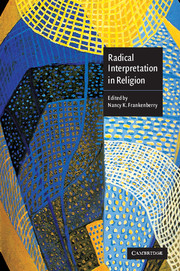Book contents
- Frontmatter
- Contents
- Notes on the contributors
- Preface
- Acknowledgments
- PART I PRAGMATICS
- Introduction
- 1 Saving belief: on the new materialism in religious studies
- 2 Radical interpretation and pragmatism: Davidson, Rorty, and Brandom on truth
- 3 Cultural politics and the question of the existence of God
- 4 Religious belief and naturalism
- PART II CULTURE AND COGNITION
- PART III SEMANTICS
- Select bibliography
- Index
1 - Saving belief: on the new materialism in religious studies
Published online by Cambridge University Press: 13 November 2009
- Frontmatter
- Contents
- Notes on the contributors
- Preface
- Acknowledgments
- PART I PRAGMATICS
- Introduction
- 1 Saving belief: on the new materialism in religious studies
- 2 Radical interpretation and pragmatism: Davidson, Rorty, and Brandom on truth
- 3 Cultural politics and the question of the existence of God
- 4 Religious belief and naturalism
- PART II CULTURE AND COGNITION
- PART III SEMANTICS
- Select bibliography
- Index
Summary
One of my enduring memories from graduate school has me shuffling back and forth between the classrooms of Mircea Eliade and Donald Davidson, trying to shake a persistent headache. Though at the time I did not see it in such antiseptic terms, it now strikes me that the general problem was the status of attributions of intentionality – in particular, how to respect the dizzying variety of religious belief and practice while recognizing that all of us share pretty much the same set of concepts. I was impressed early on with the principle of charity – roughly, the claim that broad agreement is a condition of linguistic interpretation, a claim defended, of course, by Davidson, but also endorsed in one form or another by Baker, Bennett, Brandom, Dennett, Putnam, Rorty, and Stich, to name only a few. While it is not a miracle cure, I have continued to urge its application to several of the outstanding methodological problems that arise in the study of religion, including reductionism, rationality, and relativism.
In the present chapter I turn from application to defense. I would like to address an important doubt about just how relevant this literature is to religious studies, after all. When the above-named philosophers discuss action and interpretation, they typically give pride of place to the notion of belief.
- Type
- Chapter
- Information
- Radical Interpretation in Religion , pp. 10 - 24Publisher: Cambridge University PressPrint publication year: 2002
- 13
- Cited by



